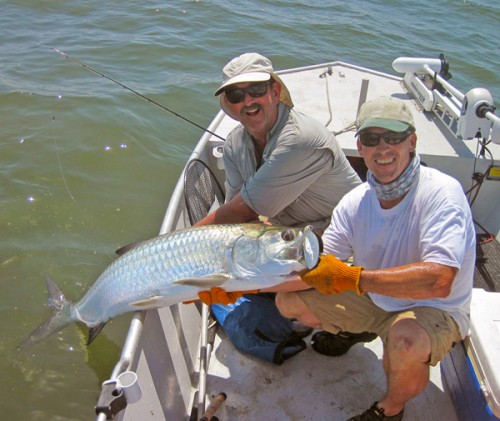PRESIDENT’S CORNER
A Message from Mike Allen, SDAFS President
I admit it, in the past I’ve seen AFS as mainly a forum for communication and the exchange of research to improve fisheries management and conservation. Possibly like you, I have mainly been involved in AFS through conferences and publications, and outside of those activities I haven’t seen a large presence from AFS on science issues. Lately, I’ve realized the impact of AFS is much broader, weighing in on national and international policy issues relevant to all of us. AFS appears poised to increase this impact in the future.
I recently had the chance to visit South Africa, and was surprised to find that AFS expertise was sought and used in fisheries conservation. Biologists with Cape Nature (the conservation agency in the western cape province of the country) had solicited the help of AFS member Brian Finlayson to help with rotenone application for removal of invasive smallmouth bass. Brian visited there and helped with the logistics, safety, and protocol in the use of rotenone. The Cape Nature biologists told me that having Brian’s help made their project better, and AFS involvement improved public outreach in South Africa as well. Holy cow, the AFS is helping fish conservation in Africa!
Recently, a bill was working through Congress termed the Invasive Species Screening Act. The bill is intended to protect against exotic organism introductions. It’s a well-intended piece of legislation with many good actions that would protect against such establishment of non-native species. However, there are a number of components to the bill that could cause unintended damage to fisheries that are supported by non-native species (e.g., rainbow trout). The Introduced Fish Section of AFS drafted a letter providing constructive critique of the bill, which was led by Jeff Hill at The University of Florida. This letter was sent to our legislators by AFS President John Boreman, and is a clear example of AFS influencing policy.
In yet another example, John Boreman recently briefed Congress about the expected effects of global climate change on fisheries. This effort was spearheaded by the Potomac Chapter AFS and others, and the briefing highlighted the number of jobs and economic loss at risk if current trends continue (http://sdafs.org/john-boreman-briefs-congress-on-climate-change). Examples like this exemplify AFS’s engagement in critical policy issues of broad importance to fisheries and conservation.
Finally, the recent announcement that Doug Austen will be the new AFS Executive Director bodes well for our impact on future legislative and policy issues. Doug has an extensive background working in both state and federal agencies and is well versed in the issues facing our field. At the last AFS Governing Board meeting in Bethesda, the board had a chance to discuss the position with Doug. He did a fantastic job, and I’m very excited about his leadership of the AFS. Doug will be working hard to put AFS front and center on policy issues that are important to aquatic resources in North America and abroad. He also plans to work with sister organizations like The Wildlife Society on issues that are paramount to all of us. That is progress, no doubt.
So, as I sit roughly halfway through my term as SDAFS president, I have seen that AFS has broad impacts to our aquatic resources. We are much more than meetings and conferences, and it’s exciting to see AFS engage our legislators on issues critical to fisheries. Thanks to everyone for the hard work they do on behalf of AFS.
Mike Allen
President, SDAFS
[su_divider top=”yes”]
